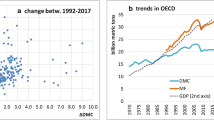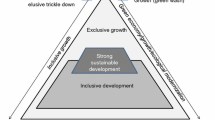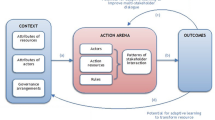Abstract
This article engages with critiques of development intervention as de-politicizing, and with viewpoints that argue that politicization often neglects technological aspects. We examine how particular definitions of the political and technological field play a role in the growing conflict between non-governmental organizations (NGOs) and the so-called post-neoliberal Movement Toward Socialism (MAS) government in Bolivia. We show that NGOs appear to have found the space to respond to public confrontation and adapt their interventions to post-neoliberal politics. While the MAS government is making efforts to bring the state back in, NGOs are trying to accommodate to a highly politicized environment by highlighting their technical strengths, and filling the current void by providing technological services. The analysis shows how, in development processes, the boundaries between the political and technical domain are not fixed. Rather, they are continuously redefined in a process in which actors shift their activities (concrete practices as well as discursive justifications) between these domains.
Abstract
Cet article répond à ceux qui critiquent les interventions d’aide au développement comme étant dépolitisantes, et à ceux qui disent que la dépolitisation néglige souvent les aspects technologiques. Nous analysons le rôle que les définitions spécifiques des domaines politiques et technologiques jouent dans le conflit croissant entre les ONG et le gouvernement soit-disant néo-libéral MAS en Bolivie. Nous montrons que les ONG semblent avoir trouvé un espace pour répondre à la confrontation publique et pour adapter leurs interventions aux politiques néo-libérales. Tandis que le gouvernement MAS s’efforce de ramener l’Etat dans le débat, les ONG s’adaptent à un environnement hautement politisé en soulignant leurs forces techniques et en comblant le vide actuel dans la prestation de services technologiques. L’analyse montre que dans les processus de développement les frontières entre les domaines politiques et techniques ne sont pas figées. Au contraire, ces frontières sont constamment redéfinies lors d’un processus au cours duquel les acteurs font alterner leurs activités (pratiques concrètes et justifications discursives) entre ces domaines.
Similar content being viewed by others
Notes
Living Well, Vivir Bien in Spanish, is inspired by the Andean concept of reciprocity and equity where people do not want to live better than anyone else but to live well together (collectively).
Examples of such NGOs are the Centre of Legal Studies and Social Research (CEJIS), the Centre for Research and Promotion of Farmers (CIPCA), Loyola Cultural Action (ACLO) and more recently the Communication Centre for Andean Development (CENDA).
Researchers isolated and tested different microorganisms for different purposes (plant growth, fertilization, disease control).
References
AIPE (2001) Documento de Trabajo: Crisis de las ONG’s y Estrategia para Enfrentar y Superarla. Cochabamba, Bolivia: AIPE.
Almaraz, A., Fernández, R., Olivera, O., Soto, G. and Hinojosa, A. et al. (2011) Manifiesto: Por la Recuperación del Proceso de Cambio para el pueblo y con el Pueblo. Retrieved 9 March 2015, from http://www.papelesdesociedad.info/IMG/pdf/manifiesto-cambio-bolivia.pdf.
Andersson, V. and Haarstad, H. (2009) Citizenship and State-Building in Contemporary Bolivia: Politization of Cultural Identity. GDS Research Series, Working Paper No. 2. Aalborg, Denmark: Aalborg University.
Arellano-Lopez, S. and Petras, J. (1994) Non-governmental organizations and poverty alleviation in Bolivia. Development and Change 25 (3): 555–568.
Atack, I. (1999) Four criteria of development NGO legitimacy. World Development 27 (5): 855–864.
Ayo, D. (ed.) (2004) Voces Críticas de la Descentralización: Una Década de Participación Popular. La Paz, Bolivia: Plural Editores.
Banco Mundial (2011) Alianza Estratégica con el País para el Estado Plurinacional de Bolivia para el Periodo AF2012–2015. Washington DC: Banco Mundial.
Bazoberry, O. and Ruiz, C. (2010) ¿Qué Esperar de las ONGs? Enfoques y Prácticas de Desarrollo Rural en los Países Andinos. La Paz, Bolivia: EED.
Bebbington, A. (1996) Organizations and intensifications: Campesino federations, rural livelihoods and agricultural technology in the Andes and Amazonia. World Development 24 (7): 1161–1177.
Bebbington, A. (1997) New states, new NGOs? Crises and transitions among rural development NGOs in the Andean region. World Development 25 (11): 1755–1765.
Bebbington, A. and Farrington, J. (1993) Governments, NGOs and agricultural development: Perspectives on changing inter‐organisational relationships. The Journal of Development Studies 29 (2): 199–219.
Bebbington, A. and Thiele, G. (1993) Non-Governmental Organizations and the State in Latin America: Rethinking Roles in Sustainable Agricultural Development. London: Routledge.
Bravo, P. (2010) Informe Final: Encuentro Nacional de Innovación Tecnológica, Agropecuaria y Forestal: Construyendo un Modelo de Innovación Participativo Basado en el Diálogo de Saberes. Workshop report, 24–26 November 2010. La Paz, Bolivia: PROINPA/Cambio Andino.
Cannon, B. and Kirby, P. (2012) Civil Society and the State in Left-led Latin America: Challenges and Limitations to Democratization. London: Zed Books.
Cartagena, P. (2012) Posibles efectos de la Ley de Revolución Productiva Comunitaria Agropecuaria sobre la economía campesino indígena. Umbrales 23: 149–180.
Cordoba, D. and Jansen, K. (2014) The return of the state: Neocollectivism, agrarian politics and images of technological progress in the MAS era in Bolivia. Journal of Agrarian Change 14 (4): 480–500.
Cordoba, D., Jansen, K. and Gonzalez, C. (2014) The malleability of participation: The politics of agricultural research under neoliberalism in Bolivia. Development and Change 45 (6): 1284–1309.
Corz, C. (2013) Gobierno expulsa de Bolivia a la ONG IBIS por injerencia política. 20 December.
Devisscher, M. (2013) Las Oenegedes en Tiempos del Vivir Bien: El Caso Bolivia. La Paz, Bolivia: CEP.
Do Alto, H. (2011) A government of social movements? The new configurations of political power in Bolivia. Paper presented at a conference on Social Movements Governance, the Poor and the New Politics of the Americas; 2–4 February, Tampa, FL.
Enríquez, L. (2013) The paradoxes of Latin America’s ‘pink tide’: Venezuela and the project of agrarian reform. The Journal of Peasant Studies 40 (4): 611–638.
Erbol (2014, January 6) Silvia Rivera asegura que ‘la derecha es el Evo’. Erbol, http://www.erbol.com.bo/noticia/politica/06012014/silvia_rivera_asegura_que_la_derecha_es_el_evo, accessed 14 January 2014.
Errejón, Í., Serrano, A. and Jordán, H.A. (2011) ¡Ahora es Cuándo, Carajo!: del asalto a la transformación del Estado en Bolivia. La Paz, Bolivia: El viejo topo.
Escobar, A. (2010) Latin America at a crossroads: Alternative modernizations, post-liberalism, or post-development? Cultural Studies 24 (1): 1–65.
Estado Plurinacional de Bolivia (2011) Ley No. 144: Ley de Revolución Productiva Comunitaria Agropecuaria. La Paz, Bolivia: Gaceta Oficial de Bolivia.
Ferguson, J. (1990) The Anti-Politics Machine: Development, Depoliticization, and Bureaucratic Power in Lesotho. Cambridge, UK: Cambridge University Press.
Gandarillas, A., Blajos, J., Aguirre, G., Devaux, A. and Thiele, G. (2007) Changing paradigms for organising R&D: Agricultural research and the creation of the PROINPA foundation in Bolivia. International Journal of Agricultural Resources, Governance and Ecology 6 (2): 256–276.
García-Linera, A. (2011a) Las Tensiones Creativas de la Revolución: La Quinta Fase del Proceso de Cambio. La Paz, Bolivia: Vicepresidencia del Estado Plurinacional.
García-Linera, A. (2011b) EL ‘Oenegismo’, Enfermedad Infantil del Derechismo. La Paz, Bolivia: Vicepresidencia del Estado Plurinacional.
García-Linera, A. (2012) Geopolitica de la Amazonia: Poder Hacendal-Patrimonial y Acumulacion Capitalista. La Paz, Bolivia: Vicepresidencia del Estado Plurinacional.
Gill, L. (1997) Power lines: The political context of nongovernmental organization (NGO) activity in El Alto, Bolivia. Journal of Latin American Anthropology 2 (2): 144–169.
Gómez, H. (2007) El último de los jacobinos bolcheviques: Entrevista con Álvaro García Linera, vicepresidente de Bolivia. Este País 192: 47–53.
Gramsci, A. (1971) Selections from the Prison Notebooks. New York: International Publishers.
Grugel, J. and Riggirozzi, P. (2012) Post neoliberalism: Rebuilding and reclaiming the state in Latin America. Development and Change 43 (1): 1–21.
Habermas, J. (1995) The Structural Transformation of the Public Sphere: An Inquiry into a Category of Bourgeois Society. Cambridge, MA: MIT Press.
Hulme, D. and Edwards, M. (1997) NGOs, States and Donors: Too Close for Comfort? London: Palgrave Macmillan.
Jansen, K. and Vellema, S. (2011) What is technography? NJAS – Wageningen Journal of Life Sciences 57 (3): 169–177.
Jessop, B. (2008) State Power. A Strategic–Relational Approach. Cambridge, UK: Polity Press.
Jica (2007) Directorio de ONG que Trabajan en Bolivia. La Paz, Bolivia: JICA Japan Desk Bolivia.
Kaup, B.Z. (2010) A neoliberal nationalization? The constraints on natural-gas-led development in Bolivia. Latin American Perspectives 37 (3): 123–138.
Kay, C. (2005) Pobreza Rural y Estrategias de Desarrollo Rural en Bolivia, Stockholm: Swedish International Development Agency (SIDA), and The Hague: Institute of Social Studies.
Kohl, B. (2003) Nongovernmental organizations as intermediaries for decentralization in Bolivia. Environment and Planning C: Government and Policy 21 (3): 317–331.
Kohl, B. and Farthing, L. (2006) Impasse in Bolivia: Neoliberal Hegemony and Popular Resistance. London: Zed Books.
Komadina, J. (2008) Democracia en tiempos de cambio: La estrategia simbólica del Movimiento al Socialismo. Tinkazos 23/24: 167–180.
Komadina, J. and Geffroy, C. (2007) El Poder del Movimiento Político: Estrategia, Tramas Organizativas e Identidad del MAS en Cochabamba (1999–2005). La Paz, Bolivia: Fundación PIEB.
Kruse, T. (1994) The politics of structural adjustment and the NGOs: A look at the Bolivian case. Master’s thesis, Cornell University, Ithaca, NY.
La Razón (2011) Las ONG y su cuota en el Estado Plurinacional. 18 September.
Layme, B. (2013) Leyes exigen a ONG adecuar sus normas para seguir en Bolivia. 29 December, p 6.
Lora, M. (2005) Álvaro García Linera: El ‘capitalismo andino’ es un paso intermedio para imaginar el socialismo. El Juguete Rabioso 138: 8–9.
Los Tiempos (2010) Morales dice que algunas ONG son ‘quinta rueda de espionaje del capitalismo’. 28 January.
Ministerio de Planificación del Desarrollo (2007) Decreto Supremo 29272: Plan Nacional de Desarrollo: Bolivia Digna, Soberana, Productiva y Democrática para Vivir Bien, Lineamientos Estratégicos 2006–2011. La Paz, Bolivia: Gaceta Oficial de Bolivia.
Molina, F. (2006) Evo Morales y el Retorno de la Izquierda Nacionalista. La Paz, Bolivia: Eureka.
Molina, F. (2011) Filantropía y Desarrollo: Ensayos para Potenciar el Aporte de las ONGs en Bolivia. La Paz, Bolivia: Fundación Milenio.
Mouffe, C. (2005) The Return of the Political. London: Verso.
Opinión (2011) Apoyos y críticas agravan la disputa por vía en el TIPNIS. 9 August.
Ortuño, N., Navia, O., Medrano, A., Rojar, K. and Torrico, L. (2010) Desarrollo de bioinsumos: Un aporte a la soberanía alimentaria de Bolivia. Revista de Agricultura 47: 30–38.
Página Siete (2011) ONG fueron sustento de Evo; Vice y canciller tuvieron altos cargos en oeneges, ahora perseguidas por el gobierno. 19 September.
Postero, N. (2007) Now We are Citizens: Indigenous Politics in Post-Multi-Cultural Bolivia. Stanford, CA: Stanford University Press.
Postero, N. (2010) Morales’s MAS government. Latin American Perspectives 37 (3): 18–34.
Postero, N. (2013) Bolivia’s challenge to colonial neoliberalism. In: M. Goodale and N. Postero (eds.) Neoliberalism, Interrupted: Social Change and Contested Governance in Contemporary Latin America. Stanford, CA: Stanford University Press, pp. 25–52.
Rivera-Cusicanqui, S. (1990) Liberal democracy and Ayllu democracy in Bolivia: The case of Northern Potosi. Journal of Development Studies 26 (4): 97–121.
Salazar, M., van der Heyden, D. and Paz-Guillen, V. (2004) Metodología de Análisis de Cadenas Productivas con Equidad para la Promoción del Desarrollo Local. Quito, Ecuador: Ruralter.
Salman, T. (2011) Entre protestar y gobernar: Movimientos sociales en Bolivia en tiempos del MAS. Tinkazos 14: 21–44.
Santacoloma, P., Suárez, R. and Riveros, H. (2005) Fortalecimiento de los Vínculos de Agronegocios con los Pequeños Agricultores. Roma, Italy: FAO.
UNITAS (2010) Primera consulta nacional: Las organizaciones de la sociedad civil como actores en el desarrollo. Paper presented at the Primera Consulta Nacional: Las Organizaciones de la Sociedad Civil como Actores en el Desarrollo; 7–8 July, La Paz, Bolivia.
UNITAS (2013) Bolivia: Unitas manifiesta ‘desconcierto y repudio’ ante expulsión de ONG danesa. Mesa de articulación. 23 December.
UNITAS (2014) Denuncian criminalización del trabajo de ONG en países andinos. Boletín virtual Unitas. 28 October.
Urioste, M. (2011) Luces y Sombras de la Ley de la Revolución Productiva Comunitaria y Agropecuaria (Ley 144). La Paz, Bolivia: Fundación Tierra.
Vaca, M. (2009) Morales cree que las ONG usan a indígenas. BBC, 1 October.
Van Niekerk, N. (1992) La Cooperación Internacional y la Persistencia de la Pobreza en los Andes Bolivianos. La Paz, Bolivia: UNITAS y MCTH.
von Freyberg, D. (2011) Financiamiento de las ONGs en Bolivia. In: R. Laserna (ed.) Filantropía y Desarrollo: Ensayos para Potenciar el Aporte de las ONGs en Bolivia. La Paz, Bolivia: Fundación Milenio, pp. 3–20.
Webber, J. (2011) From Rebellion to Reform in Bolivia: Class Struggle, Indigenous Liberation, and the Politics of Evo Morales. London: Haymarket Books.
Acknowledgements
We gratefully acknowledge the financial support of the Collaborative Crop Research Programme (CCRP) of the McKnight Foundation and Wageningen University. We would like to thank to Dr. Barry Cannon and Dr. Håvard Haarstad for their helpful comments and support. In Bolivia, our thanks go to the organisations and individuals who shared with us their views on rural development and social transformation.
Author information
Authors and Affiliations
Rights and permissions
About this article
Cite this article
Cordoba, D., Jansen, K. Realigning the Political and the Technical: NGOs and the Politicization of Agrarian Development in Bolivia. Eur J Dev Res 28, 447–464 (2016). https://doi.org/10.1057/ejdr.2015.12
Published:
Issue Date:
DOI: https://doi.org/10.1057/ejdr.2015.12




